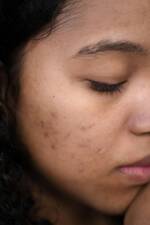
20 Jun Effective Skincare Routine for Hyperpigmentation
 Hyperpigmentation can be a challenging skin issue, but with the right skincare routine, it is possible to achieve a clearer, more even complexion. Here are the steps for a proper skincare routine to tackle hyperpigmentation.
Hyperpigmentation can be a challenging skin issue, but with the right skincare routine, it is possible to achieve a clearer, more even complexion. Here are the steps for a proper skincare routine to tackle hyperpigmentation.
Understand Hyperpigmentation
Hyperpigmentation occurs when the skin produces excess melanin, leading to dark spots or patches. This condition can result from sun exposure, hormonal changes, acne scars or inflammation. Knowing the cause helps in choosing the right products and treatments.
Cleanse Thoroughly
Start with a gentle cleanser to remove dirt, oil and impurities from the skin. Choose a cleanser that does not strip the skin of its natural oils. Look for ingredients like glycolic acid or salicylic acid, which can help exfoliate the skin and reduce pigmentation over time.
Exfoliate Regularly
Exfoliation may help in managing hyperpigmentation. It helps remove dead skin cells, allowing new, healthy skin to come to the surface. Use a chemical exfoliant containing alpha-hydroxy acids or beta-hydroxy acids two to three times a week. Avoid over-exfoliating, as this can irritate the skin and worsen pigmentation.
Apply a Brightening Serum
Using a serum for skin brightening helps reduce dark spots. Look for serums with ingredients like citric acid and glycerin. These ingredients help to lighten pigmentation and promote an even skin tone. Apply the serum after cleansing and exfoliating, allowing it to absorb fully before moving on to the next step.
Moisturize Daily
Keeping the skin hydrated is important. Use a moisturizer suitable for your skin type to lock in moisture and support the skin’s barrier function. Opt for products containing hyaluronic acid, glycerin or ceramides. Hydrated skin is healthier and better able to repair itself, which can help reduce the appearance of dark spots.
Use Sunscreen Religiously
Sun exposure can worsen hyperpigmentation. Apply a broad-spectrum sunscreen with at least SPF 30 every day, even on cloudy days or when indoors. Reapply every two hours if spending extended periods outside. Sunscreen protects the skin from UV rays that trigger melanin production, preventing existing spots from darkening and new ones from forming.
Incorporate Antioxidants
Antioxidants protect the skin from environmental damage and support the repair of damaged skin cells. Use products containing antioxidants like vitamin E, green tea extract or ferulic acid. These ingredients help to neutralize free radicals and reduce inflammation, which can contribute to hyperpigmentation.
Consider Professional Treatments
For stubborn hyperpigmentation, professional treatments may be necessary. Chemical peels, laser therapy and microdermabrasion can significantly improve skin tone and texture. Consider consulting a dermatologist such as Piction Health Online to determine the best treatment plan tailored to your skin’s needs.
Maintain a Healthy Lifestyle
A healthy lifestyle supports overall skin health. Drink plenty of water to keep the skin hydrated. Eat a balanced diet rich in fruits, vegetables and lean proteins to provide the skin with essential nutrients. Avoid smoking and limit alcohol consumption, as these can negatively impact the skin’s appearance.
Be Patient and Consistent
Treating hyperpigmentation takes time and consistency. Stick to your skincare routine and give products time to work. Improvements typically appear after a few weeks to months. Do not get discouraged and keep following your routine diligently.
By following these steps, it is possible to manage hyperpigmentation effectively. Consistency, patience and the right products are key to achieving a clearer, more even complexion.
This post is sponsored.
The information on MedicalResearch.com is provided for educational purposes only, and is in no way intended to diagnose, cure, or treat any medical or other condition.
Some links may be sponsored. Products are not endorsed.
Always seek the advice of your physician or other qualified health and ask your doctor any questions you may have regarding a medical condition. In addition to all other limitations and disclaimers in this agreement, service provider and its third party providers disclaim any liability or loss in connection with the content provided on this website
Last Updated on August 9, 2024 by Marie Benz MD FAAD
